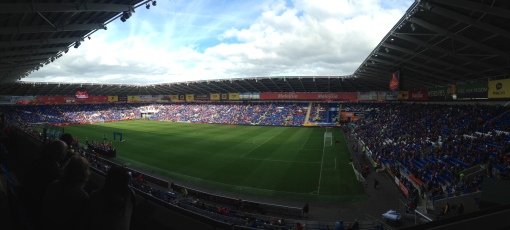When Swansea City were promoted to the Premier League in May 2011, I remember some Cardiff City fans joking that they thought their South Wales rivals would be there for four seasons – summer, autumn, winter and spring.
Three years later, Swansea have again secured their Premier League status, with Cardiff’s own top-flight experience lasting just four seasons (one year) since cruising to the Championship title last year.

Cardiff City lose 2-1 at home to Newcastle United in October 2013
It’s easy to feel sorry for Cardiff fans. Not just because I know so many of them, but also because of the way a campaign which started so gloriously against Manchester City is ending with such a whimper.
Vincent Tan finally managed to change Cardiff from blue to red pic.twitter.com/StphWxTQEM
— The FOOTBALL Bible (@TFBible_) May 3, 2014
On the field, City have taken 13 points from the 19 Premier League games since Malky Mackay was sacked on December 27. It’s a miserable return, but it wasn’t as if all was rosy with the Scot in charge. During his tenure, Cardiff picked up 17 points from 18 matches, so on course to miss the traditional safety target of 40 points.
Mackay, who guided Cardiff to the Premier League for the first time, was treated pretty poorly. But although Fulham and (probably) Norwich, the other relegated teams, have also ridden on the managerial merry-go-round this season to little or no avail, the job done by Gus Poyet at Sunderland, Tony Pulis at Crystal Palace, and even Garry Monk at Swansea, shows a managerial sacking is often worth the risk for a team mired at the bottom.
But the Mackay affair was another stick with which fans could beat the Vincent Tan regime. If Ole Gunnar Solskjaer had kept the Bluebirds up, the appointment would have been a masterstroke. As it is, the whole episode has become another entry on the ever-growing list of shoddy decisions.
Tan – an enigma in driving gloves, a moustachioed cartoon villain – might not have been entirely responsible for Cardiff’s relegation, which was sealed by a 3-0 capitulation at Newcastle. But he has robbed the club of much of its identity since his red makeover of the Bluebirds at the start of the 2012-13 season.
I’m not a Cardiff City fan – although I want to see them do well for the sake of football in Wales, and because I’ve enjoyed watching two versions of El Llasico this season – so I can’t say whether the majority would prefer to play in blue but perpetually stuck in the Championship, or in red as an established Premier League side. Obviously that debate has been rendered academic for at least a couple more seasons – Cardiff will be back in the second tier next year, and probably still in red.
I’ve had a similar issue as a Newcastle United fan. Mike Ashley has never been popular, although he hasn’t (yet?) demanded a change away from the black and white kit. His rebranding of St James’ Park was generally ignored – it’s easier to do so with that than with kit colour – but criticism usually only flares up properly when the club is doing badly (i.e. since Christmas. It’s tough for Cardiff that Newcastle’s first win in seven condemned them to relegation).
Two years too late from a paper that at times operated as cheerleaders for Tan when the rebrand was implemented pic.twitter.com/iyPkzD50G5
— Spirit of Mirko (@mirkobolesan) May 4, 2014
And so it is with relegated Cardiff. Tan’s first season at the club saw promotion, now he has overseen relegation. Where will Cardiff be this time next year? If there is an immediate return to the top flight, the grumbling will be more muted. Mid-table mediocrity, or worse, could see things come to a head.
But justifiable though criticism of Tan may be, at least Cardiff haven’t been swallowed by debt. In any case, this season ended in relegation not because of red strips but because Cardiff simply have not been good enough. On the pitch, the season hasn’t been an abject humiliation – they picked up famous wins against Manchester City and Swansea – but it did prove that the Bluebirds just didn’t have a squad of sufficient strength to compete in the Premier League.
Someone has to be relegated, and at least Cardiff haven’t “done a Derby”. The challenge for Cardiff City is for bounce back without the club’s owners further antagonising the fans, the lifeblood of any club and without commercial interests riding roughshod over the club’s history.


